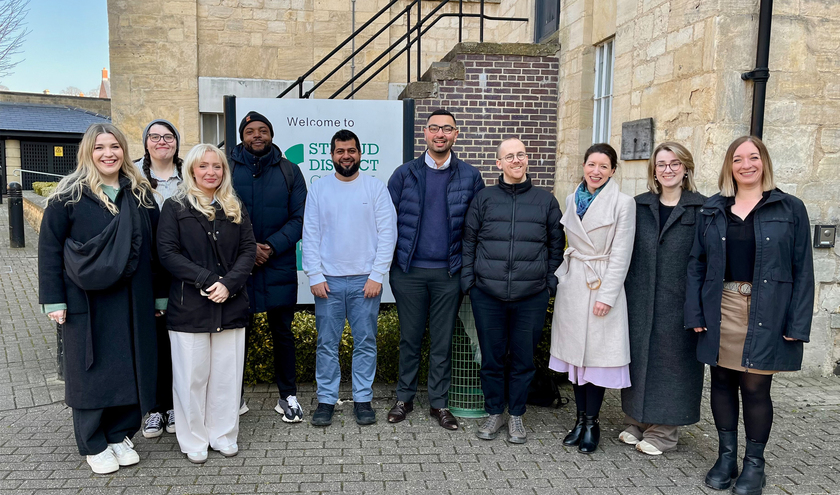In early spring, in the sunny Gloucestershire hills, the third stop for this year's contestants on the 2025 LG Challenge was Stroud DC.
The teams were welcomed to Ebley Mill, the home of the council and former woollen mill surrounded by the Cotswolds Canals.
Kicking off day one in the chamber, the challenge commenced with a briefing where leader Cllr Catherine Braun and chief executive Kathy O'Leary, outlined the potential for the teams' ideas to shape future practice.
The stage was set for the teams to explore how effectively Stroud DC's recently-developed community engagement principles can be implemented and explored further, all within the context of the council's ‘Fit for the Future' modernisation programme.
Teams were asked to prepare both a presentation and an action plan to set out how these principles can be actioned by everyone at the council.
Stroud district is a Green, minority-led council in a largely rural and environmentally-conscious area, notable for its high quality of life. While the district is a desirable place to live, it faces subtle but ongoing shifts in its population makeup which require nuanced approaches to community engagement to reflect both the established character and unique demographics of the different areas across the district.
While engaging with key council figures, teams spent day one pulling together their initial ideas about how Stroud should be using the principles, this time led by team captains Shohum Dave of Fareham BC for team Visionaries and Rebecca Dentith of North Yorkshire Council for team Ascend.
Both teams created strategies to empower all council staff to actively embody these principles in their daily roles. Both felt the council could go further, based on the positive culture set out by the leader and chief executive at the opening of the challenge and building on its good work so far.
This foundational understanding was then brought to life through an engaging historic walking tour of Stroud.
Not only was it a chance to experience the area firsthand, the tour also demonstrated an example of intentional community engagement and the principles in action.
The route explored locations of importance to Stroud's history, starting at Blackboy clock, with its supporting information plaque, co-produced with local communities, and ending at the Anti-Slavery Arch.
This was an impactful and tangible example for the teams to consider as day one drew to a close and an opportunity to delve into the area's history.
Day two saw a flurry of activity as the teams refined their proposals, homing in on the crucial aspect of embedding the community engagement principles in a practical way for the council workforce.
Both teams created strategies to empower all council staff to actively embody these principles in their daily roles. Both felt the council could go further, based on the positive culture set out by the leader and chief executive at the opening of the challenge and building on its good work so far.
Anticipation was rising with the presentations set to take place in the council chamber. Both proposals focused on the potential to refine the set of principles, and both presentations cleverly integrated insights from their interactions with council community officers from the previous day.
Team Visionaries' pitch included a real-life persona and team Ascend brought their proposal to life through an engaging role-play case study element.
The judges felt both teams presented strong ideas, including how to simplify the council's terms of engagement for staff, and how to work together with members to make sure community engagement and co-production was front and centre in all work.
After considered discussion, the panel decided it was team Ascend's proposal that most connected to the council's values and behaviours, underpinned by a clear action plan, and focused on community voices.
This Stroud challenge marks a significant milestone for the contestants, placing the teams beyond the midpoint of the Local Government Challenge.
It served as a dynamic, practical exercise, pushing the contestants to critically assess real-world community engagement strategies and develop tangible solutions.
Grace Perks is programme support co-ordinator, cyber, digital and technology at the Local Government Association


